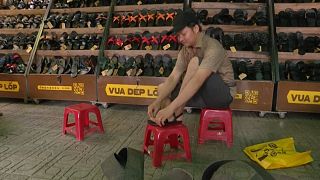France
It is highly popular in many French-speaking West African countries and is recognised by its characteristically rounded toe, braided straps and spiked sole -- the "Méduse" in French -- the language of its country of origin.
Or as the shoe is otherwise known as the plastic Medusa sandal "skeleton", "slimy", "chaka" in Cameroon, lêkê in Côte d'Ivoire, "bougie" in the Congo, "noodle", "cricri", or even "mika" in the Caribbean-- is celebrating its 75th anniversary.
The name "Medusa" comes from the similarity between the colour of the gelatinous animal and that of the first sandals.
Anne, a lover of the unique sandals has just learnt something new, "I thought it was Chinese... I never asked myself that question... And I don't know since when they have existed."
On the sole of the sandals is written "La Sarraizienne", the name of the original Auvergne brand, from which Anne-Céline Humeau -- the CEO of the Humeau-Beaupréau company bought the moulds in the early 2000s.
"It is a mythical product, especially because it was created in 1946 by La Saraizienne. After the war, there was a shortage of leather, so leather was replaced by PVC and a PVC product was injected, which is the sandal as we know it today."
Humeau-Beaupréau "is the last PVC injector in France. Everything has been relocated, a lot to China, a lot to countries with very low labour costs," says Francis Geffard, vice-president of the French Footwear Federation.
"They have relaunched this production, with this vision of a product that is more fashionable than utilitarian, and it has worked very well to the point where the Medusa has become a truly fashionable item," says Geffard.
Her team of 130 employees is based in Beaupréau-en-Mauges, a small town in Maine-et-Loire and Humeau -- where her family has been making shoes for five generations.
In the workshops, large bags of plastic balls are poured into moulds from which the sandals emerge.
She says 500,000 pairs of Medusa sandals are still sold each year.
50% of internet sales come from France -- while the rest come from abroad. according to the company.
"We first fought against counterfeiting in order to clean up the market of Asian counterfeits, which could be very present, and so we were obviously helped by the courts and today we are greatly helped by customs," says Anne-Céline Humeau.
One of the keys to success is that the "Sun" model of the Méduse brand has "really entered the habits of foreigners too", according to Guillaume Beaupréau, Anne-Céline's brother who is the company's managing director.
The sandals do well in the Asian market -- where they are often worn with socks. The shoes are very popular there because "they have monsoon periods, with a lot of rain at the end of spring, so it's a product that is really easy to use, that doesn't get damaged", explains Mr Humeau who is the Commercial Director of the Humeau-Beaupréau Group.
He added, "It's a sandal that works a lot in Asia. Historically in Japan, it was our first market. And now, we have a rise in power in countries like South Korea and also China."
Available in various colours and in all sizes and sold between 12 and 20 euros the plastic medusa sandal has marked generations of children via timeless fashion.
"I don't think I've ever seen a customer who doesn't talk to me about their holidays and their childhood when we talk about the Medusa, that's what's great, we spend more time talking about our personal memories than about the product itself," enthuses company CEO Anne-Céline Humeau.
"My children wore them, and I still wear them when we go fishing, so it's timeless," observes Cécile, a saleswoman at the Chaussold boutique in the centre of Nantes.
"It's become a fashion statement, because you see young people wearing them in the street, with socks, without socks," she continues with amusement. Her boss has kept in the back of the shop some old sandals, almost identical, that his parents, shoemakers, used to sell on the markets several decades ago.
Karine, another lover of the plastic sandals, echoes a similar sentiment, "The Medusa is about holidays, memories, sun, sea spray, and perhaps nostalgia too."
In addition to the "palette of colours that makes you want to wear them", according to Corinne Durand, manager of the "Les Courtes Pattes" shop in Nantes, the recent models are also distinguished by a structure that is "much more flexible" than the original, and the whole thing satisfies its customers, who praise "the quality" and "the very affordable price".
Indeed. after 75 years in business -- as a testament to their success, these beloved plastic sandals continue to satisfy customers worldwide.













00:53
Rare dinosaur skeleton sells for $30 million at Sotheby's 'Geek Week' auction
01:05
Pharrell Williams presents Spring/Summer 2026 collection for Louis Vuitton
00:46
Oil prices soar and stocks fall over concerns Israeli strikes on Iran could spiral into wider war
00:52
Botswana cuts back on diamond production amid weak global demand
02:16
Earth Day: Fighting microfibre pollution one laundry at a time
Go to video
Some relief at pumps for Africa as oil drops to four-year low